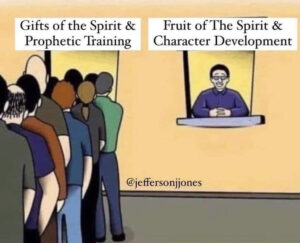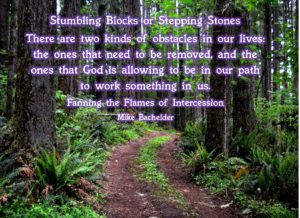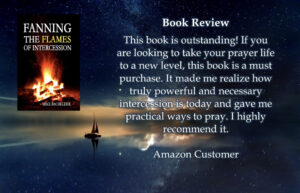Intercession and Character
This is a chapter from My Book: Fanning the Flames of Intercession.
Please check out the book here.
 In this chapter, I would like to look at the process that God uses to work His character in us. It is the deep working of the Holy Spirit in us that prepares the way for the pure and powerful flow of intercession through us. God is just as concerned with the integrity of the vessel as He is about that which dwells in the vessel. (2 Timothy 2:21) Now am I saying that you can’t be used in intercession until you have flawless character? No, God can use you as soon as you surrender your life to Him. What we need to do is recognize that what God allows us to go through is His means of working His character in us. The principle is this, God’s work in us is more important than God’s work through us.
In this chapter, I would like to look at the process that God uses to work His character in us. It is the deep working of the Holy Spirit in us that prepares the way for the pure and powerful flow of intercession through us. God is just as concerned with the integrity of the vessel as He is about that which dwells in the vessel. (2 Timothy 2:21) Now am I saying that you can’t be used in intercession until you have flawless character? No, God can use you as soon as you surrender your life to Him. What we need to do is recognize that what God allows us to go through is His means of working His character in us. The principle is this, God’s work in us is more important than God’s work through us.
“PRAYER governs conduct and conduct makes character. Conduct is what we do; character is what we are. Conduct is the outward life. Character is the life unseen, hidden within, yet evidenced by that which is seen. Conduct is external, seen from without; character is internal — operating within. In the economy of grace, conduct is the offspring of character. Character is the state of the heart, conduct its outward expression. Character is the root of the tree, conduct, the fruit it bears.” (E.M. Bounds)
“If the foundations are destroyed, What can the righteous do? The LORD is in His holy temple, The LORD’s throne is in heaven; His eyes behold, His eyelids test the sons of men. The LORD tests the righteous, but the wicked and the one who loves violence His soul hates.” (Psalms 11:3-5)
“…working itself into your conduct as God accurately reproduces his character in you.” (Ephesians 4:24 The Message)
“Being confident of this very thing, that He who has begun a good work in you will complete it until the day of Jesus Christ.” (Philippians 1:6)
This is Only a Test
Many of us, as we begin to walk with God, wonder why He doesn’t shield us from going through difficult and unpleasant circumstances. In my early days of ministry, I experienced an extremely difficult time that left me hurt, disillusioned, and confused. I couldn’t understand how God would allow all this to happen. As I desperately prayed to find some answer for all that I was experiencing, I finally heard the voice of God speak, cutting through all the confusion. He said, “Son, this is the only way that I could get you to where I want you to be.” Then I began to understand. If it were left up to me, I would usually take the path of least resistance. God not only has His ways of directing our lives, but it is in the “going through” that God shapes us into the image of Jesus. (James 1:2-4, Philippians 1:6) It is in the testing that God is accomplishing the purifying work in us to make us vessels that He can move through. In intercession, this is important because it is required that we pray the heart of God, not our own desires. Intercession must have the ingredient of selflessness to be effective. This is only one of the many attributes of God that He wants to work in us. The way it is accomplished is by the testing of the Lord. The life of Joseph is one of the clearest examples of testing in the life of a believer.
“He sent a man before them — Joseph — who was sold as a slave. They hurt his feet with fetters, He was laid in irons. Until the time that his word came to pass, the word of the LORD tested him.” (Psalms 105:17-19)
The Lord had arranged for Joseph to be tested to prepare him for all that He had called him to. Joseph could have pleaded to God for an easier way, but he didn’t. No, he held to the path that God had placed before him. A huge help in getting through the testing is just realizing that it is a test. When you are armed with this revelation, you can see what God is doing. Then you can quickly submit, get on with it, pass it and move forward. It’s when you are in the midst of the difficulty and don’t know what is happening that confusion, bitterness and blame-shifting come in. Another danger is to think we have reached a place where we have been through all of our testing and we are now free of such things happening to us.
I remember having breakfast with a young evangelist who was beginning to build a prominent ministry and was in high demand. I knew he had been saved for about seven years and I believed God wanted me to let him know that there was some testing still ahead for him. As I told him this, his response was to sit back in his chair and say, “Well I appreciate the prophetic warning brother, but I’ll have you know that I have already been through all my testing.” I responded with an “okay” and left it at that. It’s not that the brother wasn’t anointed and that he didn’t have a legitimate ministry from the Lord. But I believed God wanted him to understand that in order to reach his full potential, surrender to God’s inner work was required.
In many ways our testing will continue until the time we as an individual will enter eternity. I once had the privilege of having dinner with a man named Arthur Burt. At the time he was 95 years old and had been in the ministry for 60+ years. This man was a friend and disciple of Smith Wigglesworth. He told me that he had just been through a season of God challenging and testing him in certain areas of his life. I remember thinking, “Oh great, this is never going to end, is it?” Arthur made it clear that even after living 95 years he was still a work in progress.
 I had the privilege of learning a great lesson about character from Arthur when I went to hear him speak at a pastor’s meeting. After he finished, He asked if anyone had any questions. No one responded so we ended the meeting and had lunch. During lunch, I thought of a question to ask him. I said, “Arthur, I do have a question? How does someone go years in the ministry without going bad in the end?” I have known several leaders who had a great beginning but did not end well. So, I thought I would ask Arthur for some insight. He said something that I did not expect. He said, “You answer me this, what do you have to do to a piece of fruit for it to go bad?” Before I could say anything, he answered the question. He said “Absolutely nothing.” I assume by the look on my face it was obvious that I was not getting his drift. So, he continued, “The fruit was made by God to be taken and absorbed into the body. The second you begin to be more than just another part of the body you will begin to go bad.” All of a sudden, all the lights came on and I understood what he was saying.
I had the privilege of learning a great lesson about character from Arthur when I went to hear him speak at a pastor’s meeting. After he finished, He asked if anyone had any questions. No one responded so we ended the meeting and had lunch. During lunch, I thought of a question to ask him. I said, “Arthur, I do have a question? How does someone go years in the ministry without going bad in the end?” I have known several leaders who had a great beginning but did not end well. So, I thought I would ask Arthur for some insight. He said something that I did not expect. He said, “You answer me this, what do you have to do to a piece of fruit for it to go bad?” Before I could say anything, he answered the question. He said “Absolutely nothing.” I assume by the look on my face it was obvious that I was not getting his drift. So, he continued, “The fruit was made by God to be taken and absorbed into the body. The second you begin to be more than just another part of the body you will begin to go bad.” All of a sudden, all the lights came on and I understood what he was saying.
He finished with, “We are all like keys on a piano. We only truly shine when our key is touched by the Master, the rest of the time we are just one of the keys on His piano.”
The test of God is that which will bring us into a proper understanding of who we are in relationship to the Lord and His body. This is God’s work to conform us to the image of His son. (Romans 8:29)
“Remember how the Lord your God led you through the wilderness for these forty years, humbling you and testing you to prove your character, and to find out whether or not you would obey his commands.” (Deuteronomy 8:2 NLT)
“But who will be able to endure it when he comes? Who will be able to stand and face him when he appears? For he will be like a blazing fire that refines metal, or like a strong soap that bleaches clothes. 3 He will sit like a refiner of silver, burning away the dross. He will purify the Levites, refining them like gold and silver, so that they may once again offer acceptable sacrifices to the Lord.” (Malachi 3:2,3 NLT)
Here are some of the specific tests that God has designed for us to go through to bring us along in character so we can be effective in intercession. Though there are many more particular kinds of tests, we will look at some of the most valuable ones:
- The Test of Time
When we receive a revelation of what God has called us to, in the immediate something very interesting happens; nothing. We often automatically assume that when the Lord speaks to us about our future He is talking about next week or next month. Then as the months and sometimes years go by, we begin to wonder what is going on. Did we not hear the Lord properly? Did God, for some reason, change His mind? Is “this or that” keeping me from my destiny? Often this leads us to go to the Lord frustrated and asking questions about what is taking so long. God wants to make sure that we don’t give up on what He has spoken because of impatience. In James 1:2 we are admonished to, “Count it all joy when you fall into various trials, knowing that the proving of your faith works patience”.
Did God, for some reason, change His mind? Is “this or that” keeping me from my destiny? Often this leads us to go to the Lord frustrated and asking questions about what is taking so long. God wants to make sure that we don’t give up on what He has spoken because of impatience. In James 1:2 we are admonished to, “Count it all joy when you fall into various trials, knowing that the proving of your faith works patience”.
Remember the principle: God’s work in us is more important than God’s work through us. It is based on what God knows and what we don’t know. There are timing issues, preparation issues, maturity issues, all kinds of things that factor into the fulfillment of the word. Many of the Bible greats such as Abraham, Joseph, Moses, David and Paul had to go through this test. Are we willing to wait on His timing?
- The Test of Recognition
Matthew 6:5 “…and when you pray, you shall not be like the hypocrites. For they love to pray standing in the synagogues and in the corners of the streets, so that they may be seen by men. Truly I say to you, they have their reward.”
This test goes right after that which dwells in us as a part of our sin nature, the need for recognition and approval. Actually, our whole society is based on it. From sports to entertainment or from academics to the arts, we are expected to “perform” and “show our worth.” From a young age we learn to say, “Look at me. See what I can do.” I don’t think this is necessarily all bad, but as we begin to walk with the Lord, if we don’t submit this attitude to Him, it can trip us up.
Before I was a believer, I had a great desire to find out what my “identity” was. I was the middle kid of four brothers and a sister, and the only one yet to achieve recognition in anything. When I would meet people they would say, “Hey, aren’t you Ken-Steve-Dave-Barb’s brother?” Then at the age of seventeen, I thought I had found it. I bought an old red sparkle drum kit and began to play. I found that I had some natural talent in drums, so I threw myself into learning to play.
After a while I felt I was good enough to call myself by my newly-acquired title,
“Drummer.” There was a sense that I had at least found something I was good at. But true fulfillment didn’t come until about a year later when I was given a new title, that of “Child of God.” In the first year of my salvation, I found my new life in Christ was setting me free from much of the drive to prove myself. But I did find myself enjoying the recognition as an onfire believer. I threw myself into prayer and reading the word, wanting all of God that I could get. Upon finishing the New Testament, I said to myself, “Well I have read that book, now what do I do?” I came to the conclusion that the only logical next step was to start memorizing scripture. So, as I began to memorize the various chapters in the New Testament, word got out that I really knew the Bible, and I liked the attention. Then I arrived at my big opportunity to “show off” my great accomplishment. I was asked during a Bible study to read a certain passage. As my good fortune would have it, it was a verse that I had memorized. So, with a smile on my face, I abruptly closed my Bible and proceeded to recite the verse.
As I started to speak, to my immediate embarrassment, the Lord extracted the verse from my memory. With a red face I clumsily fumbled in my Bible to find the verse. God is going to give us plenty of opportunity to shine. But will it be for our glory or His? Like Paul said in 2 Corinthians 10:17, “he who glories, let him glory in the LORD.”
- The Test of Promotion
1 Samuel 2:7, “GOD brings poverty and GOD brings wealth; he lowers, he also lifts up.” (The Message)
 A good indicator that we are being challenged by this test is when we think we have a right to some position or title. We often like to apply the world’s means of promotion to our life and ministry. But once again, God’s ways are not our ways. In the world things such as seniority, ambition, dedication, skill and flattery are what get a person promoted. The key is making a good impression on the person doing the promoting. If you work hard and prove your worth, you will get ahead. If we overlay this template in our ministry situations, we will have problems. Our first one will be in trying to impress the person over us. Often this is the Pastor or some other leader. We might think that if we approach this politically, it will work. Wrong. We must understand that true promotion comes from the Lord. He will then channel it through designated authority but it comes from Him.
A good indicator that we are being challenged by this test is when we think we have a right to some position or title. We often like to apply the world’s means of promotion to our life and ministry. But once again, God’s ways are not our ways. In the world things such as seniority, ambition, dedication, skill and flattery are what get a person promoted. The key is making a good impression on the person doing the promoting. If you work hard and prove your worth, you will get ahead. If we overlay this template in our ministry situations, we will have problems. Our first one will be in trying to impress the person over us. Often this is the Pastor or some other leader. We might think that if we approach this politically, it will work. Wrong. We must understand that true promotion comes from the Lord. He will then channel it through designated authority but it comes from Him.
The next problem comes in when someone else is promoted and we think it should be us. For example, let’s say the Pastor decided to put someone in charge of intercession in the church and he gives the position to another brother or sister. We might say, “Who do they think they are? After all, I am more qualified than they are. I have more gifting and I have been here longer. I have also been doing all I can to prove to the Pastor that I am the best one for the position. I guess maybe I should leave and go somewhere I will be used and appreciated.” No, you shouldn’t leave. You should stay and realize God is testing you and you need to submit to the process. Paul is very clear in Galatians 5:26, “That means we will not compare ourselves with each other as if one of us were better and another worse. We have far more interesting things to do with our lives. Each of us is an original.” (The Message) Romans 12:10 says, “Be kindly affectionate one to another with brotherly love; in honor preferring one another.” In 1 Peter 5:6, Peter chimes in, “Humble yourselves therefore under the mighty hand of God, that he may exalt you in due time.”
We need to come to the place we are fine with promotion and we are also okay with lack of promotion. As long as it is what God wants, it is alright. I know that sometimes this test comes with strong emotions of being treated unfairly or unjustly. This is a time to trust His grace and draw close to the Father and He will get you through it. It is in this place of trust that we can rest in the knowledge that we have already been promoted to the highest position possible, which is the grand title of son or daughter of the Most High God.
- The Test of Ambition
The Oxford dictionary definition of ambition is this: “strong desire to do or achieve something, desire for success, wealth or fame.” This word had its origin in the practice of Roman candidates for office, who went about the city to solicit votes. Not all ambition is wrong. There are many things in life that people go after and achieve and we honor them for that. But what we are referring to in this test is what the Bible calls selfish ambition.
Paul speaks of in this way, “The former insincerely preach Messiah from selfish ambition, thinking that they add affliction to my chains.” (Philippians 1:16) “Let nothing be done through selfish ambition or conceit, but in lowliness of mind let each esteem others better than himself.” (Philippians 2:3) Then James goes even a bit deeper, “But if you have bitter jealousy and selfish ambition in your heart, don’t boast and don’t lie against the truth.” (James 3:14) “For where jealousy and selfish ambition are, there is confusion and every evil deed.” (James 3:16)
One of the most important character defects that God is going after in His people today is selfish ambition. The drive within us to succeed, achieve and accomplish that which we have vision for. The linchpin of ambition is our motive. What makes us sacrifice our time, energy and, often times, finances to see our vision accomplished? What is actually in our hearts as a motivation?
This is the main thought in Hebrews 4:12, “For the word of God is quick, and powerful, and sharper than any two-edged sword, piercing even to the dividing asunder of soul and spirit, and of the joints and marrow, and is a discerner of the thoughts and intents of the heart”. The test of ambition is to reveal to us the true motive (thoughts and intents) of the actions we take and the words we say. Though it may all look good on the outside, God judges our heart. The Lord wants our service to be pure, not mixed with our own self-seeking ambition. If we go the way of ambition, we can produce for a while, but in the long run ultimately, we lose. William Shakespeare said it this way:
“Cromwell, I charge thee, fling away ambition;
By that sin fell the angels. How can man then,
The image of his maker, hope to win by it.”
When it comes to the whole area of selfish ambition, the Lord put it to me like this, “I want your life to be like a well that others can draw living water from. The well first must be dug and the debris that is removed is all of your selfish ambition.” He wants a pure stream coming forth from us to bring life to others. He wants us to intercede based on His agenda, not our own. So, in this test, it is the piercing light of the Word that brings the Spirit of truth to bear on any gray areas of ambition in us. Then by His kindness, He leads us to repentance.
I see selfish ambition as one of the scourges of the twenty first century western church. How many church splits, troubles and devastation have this evil at its root? In our society we honor, praise and glorify people for their ambition to accomplish great things. We show them great respect for their ability to “make it happen” in the realm of earthly achievement. Now this is not all bad, however when you try to apply the same thought in the context of kingdom, things can get sticky. In this test God is after not just what we do, but the motor that drives us to do it. The intents of the heart are what He is after. He wants to be our sole motivation for all we do for Him, and His power the motor. He has ordained us for good works, but He wants those works to be motivated by love.
Sometimes I think we have heard 1 Corinthians 13 so much that we forget that most of the chapter deals with motive. A love relationship with Jesus is the key to living after His heart instead of our own. Jesus said, “for without me you can do nothing.” (John15:5) The word “nothing” in this verse comes from the Greek word, “ouedis.” The word literally means “not even one”, which infers that we can do nothing of eternal significance without being totally dependent on Him. So it seems selfish ambition has to go or all we will have left is hay, wood, and stubble. We must allow the Holy Spirit to deal with us in this area so we can move into the “greater works” that He has called us to.
- The Test of Achievement
As I began to write about this test, I had just returned from a prayer hike. While walking through the woods near our house in Gartcosh, Scotland, the Holy Spirit led me into a time of prayer, repentance and healing. He had spoken to me about something that had developed in my heart as a young man.
I grew up in Western Oregon as the number three son of a mother who was raised on a ranch in Idaho and a dad who was a bona fide lumberjack. My dad was a timber faller for Weyerhaeuser Company in the 1950s, 60s, and 70s. He was one of the best loggers that Oregon has ever seen. I grew up loving the outdoors. Much of my childhood was spent hiking, fishing, camping and anything else to do with just being outside. One of the things that we loved to do as a family was to go deer hunting. And yes, my mother was as good a hunter, or better, than any of us.
 I loved hunting as a boy, and though I don’t do it as much these days, I still think it’s great. However, as I became a young man, something happened in my heart that changed how I approached the time I spent hunting. Somehow, I adopted a prideful need to achieve to prove to my friends, and I guess myself, that I was a good hunter. That drive to achieve caused me to do whatever it took to bag the big one. It was no longer about just being in the outdoors and having a great time, it was about trying to prove something.
I loved hunting as a boy, and though I don’t do it as much these days, I still think it’s great. However, as I became a young man, something happened in my heart that changed how I approached the time I spent hunting. Somehow, I adopted a prideful need to achieve to prove to my friends, and I guess myself, that I was a good hunter. That drive to achieve caused me to do whatever it took to bag the big one. It was no longer about just being in the outdoors and having a great time, it was about trying to prove something.
That morning as I was on my hike, the Holy Spirit revealed that I had never truly repented of this heart attitude. As I walked through the issue with the Holy Spirit, I felt a great release come. Then to top it off, as I finished the prayer, a deer walked out of the woods onto the trail and stopped to look at me. I was overcome with the love and goodness of God for setting me free. It is a wonderful thing to walk free of the selfish drive to achieve.
Now, am I saying that it is wrong to achieve things in life? Of course not. What I am saying is that God wants us to be free from the drive to achieve that is rooted in our carnal nature, fueled by a performance mentality. This is a bit different than the test of ambition. This deals with the idea that our worth and value in life is based on what we achieve. God wants us to know that no matter what we are able to do for Him, it is only as we are enabled by grace that we can do it. Bill Johnson said it this way, “Poor in spirit is that place of humility where you realize everything comes simply as a gift of grace.” (From the message,“The Enemy Within”)
That which we do achieve in the kingdom should not be based on our ability, but on the peaceful, joyful, satisfying life connection with God that we have. Jesus referred to this connection in John 15:5. “I am the vine, you are the branches. He who abides in Me, and I in him, bears much fruit; for without Me you can do nothing.”
It is out of our knowing of Him that we can achieve fruit in this life that is lasting, worthwhile and ultimately eternal. Jesus brought His point home in some of what I consider the most sobering verses of the New Testament. I can still feel the “ouch” in Matthew 7:2123. “Not everyone who says to Me, ‘Lord, Lord,’ shall enter the kingdom of heaven, but he who does the will of My Father in heaven. Many will say to Me in that day, ‘Lord, Lord, have we not prophesied in Your name, cast out demons in Your name, and done many wonders in Your name?’ And then I will declare to them, ‘I never knew you; depart from Me, you who practice lawlessness!’ ”
Now it wasn’t what these people achieved that was wrong, it was that they achieved it without knowing Him that was wrong. Knowing always comes before doing. In intercession one of the things, we have to deal with is the fact that often we will never know until heaven what was achieved by our prayers. We must come to a place where that is all right with us.
These five tests are by no means the only ones that God has arranged for us, but the good news is that they are all “open book” and He promises to be with us every step of the way.
Revelation by the River
In the building of character, it is not as much about God removing the negative from us, as it is about him imparting the positive into us. Many of us have a great hunger to “go deep” in the things of God. Although this is God’s heart for us, we must first allow Him to “go deep” in us and root out those issues that have become obstacles to us. This is why the ministry of (Holy Spirit led) inner healing is so important.
 This is how the Lord put it to me one day while I was praying by the McKenzie River in Oregon. (This was during a time when God was moving and many were talking about being “in the river” of God’s presence.) He said, “Look at that tree by the river bank.” As I looked, I saw a tree that was standing but barely hanging on the bank by its roots. Then he said to me, “If you want to be in the river you need to be prepared to have your roots exposed. When this happens, if you respond correctly, I will, as the husbandman, come and shore up your roots and you will remain a strong tree planted by the river. If you harden your heart instead of responding, the tree will fall.” As he spoke, I was shaking in the fear of the Lord.
This is how the Lord put it to me one day while I was praying by the McKenzie River in Oregon. (This was during a time when God was moving and many were talking about being “in the river” of God’s presence.) He said, “Look at that tree by the river bank.” As I looked, I saw a tree that was standing but barely hanging on the bank by its roots. Then he said to me, “If you want to be in the river you need to be prepared to have your roots exposed. When this happens, if you respond correctly, I will, as the husbandman, come and shore up your roots and you will remain a strong tree planted by the river. If you harden your heart instead of responding, the tree will fall.” As he spoke, I was shaking in the fear of the Lord.
The interesting thing was that the very next time I went to the river to pray, a few days later, that same tree had fallen into the river, barely hanging on to the bank by its roots. Then the next time I went to that place, that tree was gone, washed downstream. Now the exposing I believe He was talking about isn’t necessarily to people. It is when the Lord reveals our heart to us, we must respond and allow Him to work a deep work in us. David said in Psalms 26:2, “Examine me, O LORD, and prove me; try my mind and my heart.” The word try is the Hebrew word tsâraph which means, “To fuse metal, that is, refine, cast, founder, goldsmith, melt, pure, purge away, try.” (Strong’s) In Isaiah 48:10 the Lord talks about bringing us through this process. “Behold, I have refined you, but not as silver; I have tested you in the furnace of affliction.”
Vessels of Honor
For a long time, I couldn’t figure out how to reconcile the idea of being a broken vessel and being a vessel of honor. Then one day it hit me. If we will allow brokenness to lead us to the Healer, then He will mend us and transform us into vessels of honor for His glory.
Brokenness + Mending = Vessel of Honor
In Mark 14:3, we read about a woman coming to Jesus with an alabaster box. She broke the box and poured the ointment on the head of Jesus, releasing a great fragrance into the room. To have the true fragrance and anointing of Christ operating through us, we must allow the breaking to happen. Brokenness not only releases the anointing, but it qualifies us to operate in the anointing. Ultimately it is God himself who is the author of the breaking process. I came across some interesting verses. In Hosea 6:1 it says, “Come and let us return to the Lord. For He has torn, and He will heal us; He has stricken, and He will bind us up.” Psalms 51:8 says, “Make me hear joy and gladness, that the bones You have broken may rejoice.”
At first it offended my religious mind to think that God Himself was allowing my brokenness. We need to come to the place where we truly believe God is in control and that He knows what He is doing. Graham Cook said it this way, “God allows in his wisdom what he could easily prevent by his power.” Our brokenness isn’t an accident, but it is by design.
I remember being at a conference that had two different men singing a special song. The first night one brother sang and the anointing was so powerful that there was hardly a dry eye in the place. The next night another brother sang who was equally talented musically, but when he sang the anointing was flat. In my curiosity I asked the Lord, “What was the difference between these two brothers?” He said at one word, “Brokenness.” It appeared to me that one brother had allowed God to work deep in his life and sanctify his gift. The other brother had not. Ultimately it is the divine work of brokenness that qualifies us for the anointing.
Brokenness is that which, if we will allow it, brings us closer to Him. Psalms 34:18 says, “The LORD is near to those who have a broken heart, And saves such as have a contrite spirit.” Then in Philippians 3:10, “that I may know Him and the power of His resurrection, and the fellowship of His sufferings, being conformed to His death.” As we cooperate with this process of brokenness, we will be transformed into vessels of honor. (2 Timothy 2:21)
In Isaiah 64:8 we read, “But now, O LORD, You are our Father; we are the clay, and You our potter; And all we are the work of Your hand.” One of the main keys to building the character of Jesus is just staying on the potter’s wheel long enough for Him to shape us. Often at a crucial point in the molding we want jump off the wheel and do it our way for a while. I challenge you to stay on the wheel and let God make you into a vessel of honor He can move through mightily in intercession.
Obstacles or Opportunities
 An obstacle is “a thing that blocks one’s way or hinders progress.” (Oxford) When we refer to someone’s “walk with God,” we are talking about their life journey on the straight and narrow path. Obstacles are that which attempts to slow, hinder and, if possible, stop our growth and progress as believers. These could be good things in our lives, not just bad. They could be big walls, or small stones we trip over. Everything, has the potential to be an obstacle, from secret sin to “good” things that nobody would seem to question. This idea is put forth in 2 Timothy 2:3-4, “You therefore must endure hardship as a good soldier of Jesus Christ. No one engaged in warfare entangles himself with the affairs of this life, that he may please him who enlisted him as a soldier.”
An obstacle is “a thing that blocks one’s way or hinders progress.” (Oxford) When we refer to someone’s “walk with God,” we are talking about their life journey on the straight and narrow path. Obstacles are that which attempts to slow, hinder and, if possible, stop our growth and progress as believers. These could be good things in our lives, not just bad. They could be big walls, or small stones we trip over. Everything, has the potential to be an obstacle, from secret sin to “good” things that nobody would seem to question. This idea is put forth in 2 Timothy 2:3-4, “You therefore must endure hardship as a good soldier of Jesus Christ. No one engaged in warfare entangles himself with the affairs of this life, that he may please him who enlisted him as a soldier.”
The Hebrew word for “entangles” is “empleko” which means “to entwine.” There are many things in life that we can get wrapped up in. If it hinders our walk with Jesus, it must be brought into question and examined. Even the little things can trip us up. After all, it is the little foxes that spoil the vine. (Song of Solomon 2:15)
Hold what you value with an open hand. If you try to possess it with a firm grasp, it will slip through your fingers. I read this prophetic word from Marsha Burns that I thought was fitting: “The earth is Mine and all that is in it, says the Lord. You cannot own what does not belong to you, and I continue to establish the concept of stewardship and not ownership in the hearts of My people. You, beloved, are only sojourners on the earth, not permanent residents. Your earthly existence is but for a moment. Keep eternal perspective. Let go, and yield to the work and moving of My Spirit.” (From Small Straws in A Soft Wind by Bill and Marsha Burns. A daily prophetic blog)
Stumbling Blocks or Stepping Stones
There are two kinds of obstacles in our lives: the ones that need to be removed, and the ones that God is allowing to be in our path to work something in us. Let’s allow the ones that remain to be an opportunity for us to rise up and turn them into stepping stones in our walk with God.
 This was Paul’s attitude in 2 Corinthians 12:7-10, “And lest I should be exalted above measure by the abundance of the revelations, a thorn in the flesh was given to me, a messenger of Satan to buffet me, lest I be exalted above measure. Concerning this thing I pleaded with the Lord three times that it might depart from me. And He said to me, ‘My grace is sufficient for you, for My strength is made perfect in weakness.’ Therefore most gladly I will rather boast in my infirmities, that the power of Christ may rest upon me. Therefore I take pleasure in infirmities, in reproaches, in needs, in persecutions, in distresses, for Christ’s sake. For when I am weak, then I am strong.”
This was Paul’s attitude in 2 Corinthians 12:7-10, “And lest I should be exalted above measure by the abundance of the revelations, a thorn in the flesh was given to me, a messenger of Satan to buffet me, lest I be exalted above measure. Concerning this thing I pleaded with the Lord three times that it might depart from me. And He said to me, ‘My grace is sufficient for you, for My strength is made perfect in weakness.’ Therefore most gladly I will rather boast in my infirmities, that the power of Christ may rest upon me. Therefore I take pleasure in infirmities, in reproaches, in needs, in persecutions, in distresses, for Christ’s sake. For when I am weak, then I am strong.”
We must realize there is abundant grace for any obstacle that we face and that ultimately, we must see obstacles as opportunities.
What Is It Really All About?
What the issue is really all about is God bringing me as an individual to the end of myself. This is the idea behind 2 Corinthians 4:7, “…but we have this treasure in earthen vessels that the excellence of the power may be of God and not of us.”
I had a vision that demonstrates this point. In the vision I was walking on a dry, rocky trail that I sensed had been very hard to walk. As I walked along, I came to a line across the trail, and written on my side of the line were the words, END OF SELF. As I stood before this line I heard the Lord speak into my spirit. He said, “Will you cross this line?” I knew in the vision that I had come to a place where I had nothing left to hold on to. So, I said to the Lord. “Yes, I will. What have I got to lose?” As I stepped across the trail, it turned from a dusty, rocky trail to a path made of pure gold. It was like being in a place where the mysteries are revealed. Every direction I would look I would see a new facet of God and the wonders of His kingdom. It was also a place of instant answers to prayer. I would say, “Lord I need…” and I would have it before I could finish the sentence. It was a place of total communion and intimacy with the Lord. I believe what God was showing me was not just heaven, but a place in the Spirit that we can live in now.
If we are going to be effective in intercession, or anything in the kingdom for that matter, this is the place we must live. Jesus said, “He who finds his life shall lose it. And he who loses his life for My sake shall find it.” (Matthew 10:39)
Dealing with Heart Issues
When we talk about God working in our character, what we are really referring to is allowing him to deal with our heart issues.
“Keep your heart with all diligence, for out of it spring the issues of life.” (Proverbs 4:23)
The Holy Spirit wants to bring us to a place where He can remove those things in our lives that are continually tripping us up and impeding our forward progress. Sometimes the issues are blatantly obvious to us, and other times we don’t seem to have a clue they are there. Either we don’t see, them or we choose not to see them, especially when our issues are connected to past wounds and hurts. We must allow the Holy Spirit to move deep within us to bring healing, wholeness and restoration. If we do not allow the Spirit to touch our issues, we can easily become wounded people who wound other people.
The Lord gave me a picture of what can cause such wounding. I saw a picture of a brother with a shield strapped to his arm. This shield was a defense mechanism to ward off possible wounding. The second anyone would try to address an issue in this brother’s life, he would throw up the shield to protect himself and, in the process, knock the others down, sometimes even severely wounding them. Then he would lower his shield and ask what they were doing on the ground, having no idea how he could possibly be the cause of the wounding. So this brother would continue to wound people without necessarily even being aware of it. If we are wounding people, let’s get healed so it will stop. If we have been wounded by someone, let’s forgive the person and let the Holy Spirit bring healing and restoration into our lives. Let’s allow the Holy Spirit to deal with our issues, no matter what they are; from pride to self-pity or lack of forgiveness to fear.
 When we talk about deep-rooted issues, many of them are mindsets that have developed. If mindsets go unchecked, they become strongholds in our lives. The dictionary definition of stronghold is “a place that has been fortified against attack.” The definition of mindset is “a habitual way of thinking.” Ed Silvoso described a stronghold this way, “A mind-set impregnated with hopelessness that causes us to accept as unchangeable situations that we know are contrary to the will of God.”
When we talk about deep-rooted issues, many of them are mindsets that have developed. If mindsets go unchecked, they become strongholds in our lives. The dictionary definition of stronghold is “a place that has been fortified against attack.” The definition of mindset is “a habitual way of thinking.” Ed Silvoso described a stronghold this way, “A mind-set impregnated with hopelessness that causes us to accept as unchangeable situations that we know are contrary to the will of God.”
The starting point of beginning to address such mindsets is described in 2 Corinthians 10:5 “…casting down arguments and every high thing that exalts itself against the knowledge of God, bringing every thought into captivity to the obedience of Christ…” We must begin to address the strongholds in our lives.
Final thought – In this chapter I know that much of what we discussed can be a bit hard to process. It is great to know that the promise of Scripture is that we will walk in the peaceable fruit of righteousness (Hebrews 12:11). Will it be worth it all? Most definitely.
Note: I would like to thank Frank Damazio and Graham Cooke for their teaching and inspiration to me in writing this chapter.



Comments are closed.